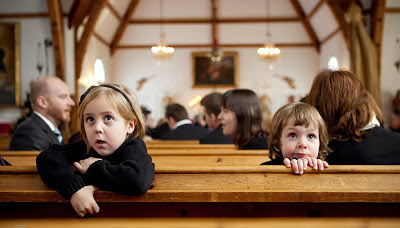Almost every church congregation that I’ve ever been a part of—whether as parishioner or pastor—has had one particular goal in common: attract more families with young children. Everybody wants more of these kinds of families in their churches, often because they are seen as a way of helping to insure faith communities’ growth into the future.
Whether or not families with young children are actually the key to a church’s continued vitality, or whether it is even appropriate to think about families in this way (in which families almost seem like a means to an end), are matters of intense debate—a debate which goes far beyond the scope of this post. Instead, what seems obvious is that if you want to invite more families with young children into your faith community, how you go about it is very important.
Given the many different demands of today’s culture, families simply aren’t going to devote a lot of time and energy to an organization where they don’t feel welcome. From my point of view, then, hospitality is the key to inviting families to visit your congregation, and perhaps to find a home there.
But what does hospitality look like for families with young children? What can churches do to welcome families with young children in congregations in ways that feel inviting and supportive? Here are a few ideas:
Ask the families!
If you already have families with young children in your congregation, ask them what the church might do to be more helpful to them. Maybe it would be providing child care for more church events, or planning a social time for parents to get to know one another better. It might even be something as simple as putting a changing table in the restroom. You may never know what would be most helpful to parents and their young children until you ask them. I suggest this not in a consumerist, “we’re going to give you whatever you want so you’ll be happy and stay here” kind of way. Rather, I think it’s a basic function of Christian community to find out what helps people feel truly welcomed, and then try to provide that in ways congruent with your congregation’s mission. If you don’t currently have families with young children in your congregation, ask families you know what would really communicate hospitality to them if they were to visit your church. You might be surprised by how simple and doable the answers are.
Keep children safe
Many of our Christian congregations pay close attention to children’s safety issues when it comes to things like broken playground equipment. But when it comes to keeping children safe from sexual or physical abuse, churches have often resisted implementing appropriate policies. Many congregations think “That could never happen here!”–and yet, it does. One of the most powerful ways of extending hospitality as a church is to show parents that their children’s safety is your top priority. If your church doesn’t already have clear policies in place to help protect children from abuse, consider creating some as soon as possible. There are many resources available to help churches with this. The “Safe Sanctuaries” curriculum, provided by the United Methodist Church, is one such resource. Be sure to check with your own denomination and/or judicatory to find out what is recommended for your particular congregation. If you already have safety policies in place, assess them regularly to make sure they are working properly and that they comply with the most recent state laws (for example, the Commonwealth of Pennsylvania now has more stringent abuse reporting requirements in place than it did a few years ago. You can read a summary of the new requirements online.
Make worship a welcoming space for children
This one is complicated, because what “welcoming” means is going to vary a lot for individual families, and for different kinds of congregations. Even so, I think most of us realize that expecting very young children to be perfectly quiet and still for long periods of time during worship is not realistic. There are many different ways churches can make their worship time and space hospitable for children. Here are just a few ideas:
— Provide worship “kits” containing coloring materials or simple craft items that children can play with quietly during the service.
— Integrate more child-friendly elements into worship itself – for instance, sing simple choruses that children can easily learn and that don’t require reading; include embodied or interactive activities (marching around the sanctuary waving palms on Palm Sunday is a great example of this); or have children help act out a Bible story.
— Create a congregational culture where children are seen as vital to the worship experience, rather than as a distraction from it. Granted, this one is probably a lot easier said than done. But one Lutheran congregation in Apple Valley, Minn., modeled this in a very creative way by creating a “pray-ground” in the front of the sanctuary, where children can simultaneously play and be near what is going on in worship.
Welcoming families with young children into our congregations is important because as Christians, we are called to extend God’s love and care to all people. Finding ways to be as hospitable as we can to the families who walk through our doors is not only good manners; it’s good discipleship.
The Rev. Dr. Leanna K. Fuller is assistant professor of pastoral care at Pittsburgh Theological Seminary and teaches in the MDiv Program. Her ministry experience includes serving as associate pastor of Oakland Christian Church in Suffolk, Va., where she coordinated youth ministry and Christian education programming. She writes regularly on pastoral care and counseling, pastoral theology, and congregational conflict.


Cheers pal. I do aptirceape the writing.
great